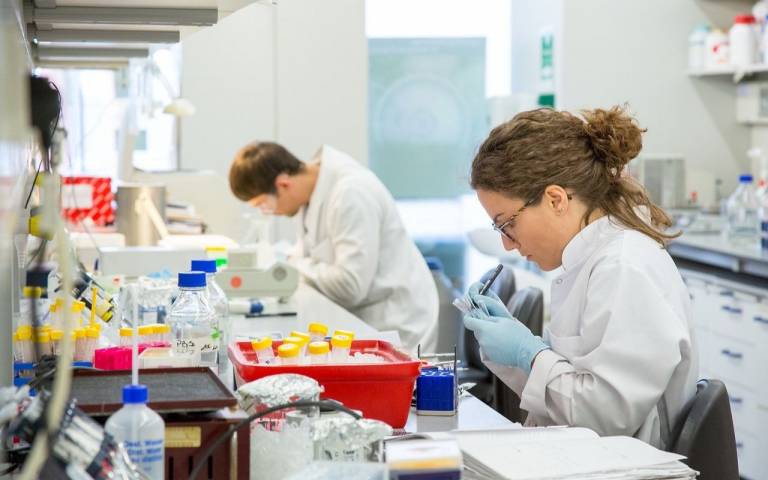UCL cancer research recognised in UK’s Best Breakthroughs List
6 December 2018
UCL’s breakthrough treatments for leukaemia and aggressive cancers have been featured in a list of the UK’s 100 best breakthroughs of the last century for their significant impact on people’s everyday lives.

The list of breakthroughs demonstrates how UK universities are at the forefront of some of the world’s most important discoveries, innovations and social initiatives, which also includes the discovery of penicillin, work tackling plastic pollution, ultrasound scans to check the health of unborn babies and the establishment of the Living Wage.
The list also highlights the less celebrated but vital breakthroughs that transform lives, including a specially-designed bra to help women undergoing radiotherapy; a toilet that flushes human waste without the need for water; the development of a new scrum technique to make rugby safer; a sports initiative that aims to use football to resolve conflict in divided communities; - and even work to protect the quality of the chocolate we eat.
The list was compiled by Universities UK, the umbrella group for UK universities, as part of the MadeAtUni campaign to change public perceptions of universities and bring to life the difference they make to people, lives and communities across the UK.
It follows independent research undertaken by Britain Thinks which found that the public has little understanding of the benefits of universities beyond undergraduate teaching. The findings show that research is one of the key triggers to change opinion about universities but for many people, it is an abstract concept.
Supporting the UUK campaign, UCL President & Provost Professor Michael Arthur said: “Universities are transforming lives everyday by working to solve some of the biggest issues facing the world and by engaging with their local communities.
“The breadth and impact of discoveries made at UK universities highlighted by this campaign is extraordinary and shows how we are all benefitting from the innovative and hard work of researchers.
“At UCL, we’re extremely proud of our ground-breaking research which spans a multitude of areas, from communications technology and space to sustainable cities and education.
“We are delighted to be supporting the campaign and as part of it, we are highlighting our world-leading cancer research which has revolutionised diagnosis and treatment of the disease, helping transform the lives of millions of patients worldwide.
“This includes pioneering work in using T-cell therapies to treat childhood leukaemia, a more accurate test for prostate cancer diagnosis that removes the need for a biopsy and a new treatment for ovarian cancer.”
UCL researchers, including Dr Martin Pule, Dr Claire Roddie and Professor Karl Peggs (all UCL Cancer Institute) and Professor Emma Morris (UCL Infection & Immunity), along with colleagues in UCL’s partner hospitals, have played a leading role in developing CAR T-cell therapy, which modifies the immune system to destroy cancer cells.
“T-cells are like little robots on a seek-and-destroy mission. We re-programme them to detect and fight cancer,” explains Dr Pule.
Professor Waseem Qasim (UCL Great Ormond Street Institute of Child Health) has brought this research into clinical practice in pioneering work using T-cell therapies to successfully treat childhood leukaemia.
UCL cancer researchers have also led advances that have doubled the accuracy of prostate cancer diagnosis, led by Professor Mark Emberton (Dean, UCL Faculty of Medical Sciences), allowing over one million men a year to avoid an unnecessary biopsy.
Another key breakthrough has been led by Professor Jayant Vaidya (UCL Surgery & Interventional Sciences) in developing a single-shot dose of radiotherapy, TARGIT IORT, for use during breast cancer surgery to remove the need for weeks of postoperative radiotherapy.
Professor Dame Janet Beer, President of Universities UK, said: “Universities really do transform lives. The technology we use every day, the medicines that save lives, the teachers who inspire – all come from UK universities and the important work being done by academics.
“The UK’s Best Breakthroughs list is a testament to the difference that universities make to people’s lives and we want everyone to join us in celebrating the work they do.”
The UK’s Best Breakthroughs list: 100+ Ways Universities Have Improved Everyday Life was put together in partnership with universities across the UK. As part of the MadeAtUni campaign, every university in the country was invited to nominate the one thing from their institution which they believe has had the biggest impact on people, lives and communities. The entries cover health, technology, environment, family, community and culture and sport.
Links
- MadeatUni campaign website
- UCL's MadeatUni entry
- UCL cancer research domain
- UCL Cancer Institute
- UCL Infection & Immunity
- UCL Great Ormond Street Institute of Child Health
- UCL Surgery & Interventional Sciences
- Universities UK
Image
- Cancer research at UCL
Media contact
Chris Lane
Tel: +44 (0)20 7679 9222
Email: chris.lane [at] ucl.ac.uk
 Close
Close

